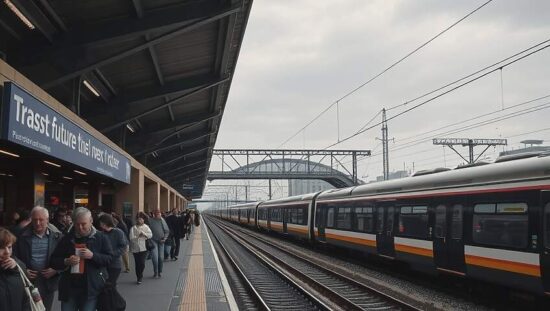The cities of Halle (Saale) and Erfurt are jointly intensifying their bid to host the future corporate headquarters of Deutsche Bahn (DB), challenging Berlin’s longstanding dominance and sparking political debate surrounding the national rail operator’s strategic direction. The move, formally launched this week, is predicated on the impending expiration of DB’s lease for the DB-Tower in Berlin’s prestigious Potsdamer Platz in 2033.
Erfurt’s Mayor Andreas Horn emphasized collaboration rather than competition, framing the proposal as a boost for central Germany and the eastern states. Both cities tout their strategic central location, excellent connectivity via the new high-speed ICE line between Berlin and Munich and robust rail infrastructure as key advantages. Existing high-performance railway hubs with comprehensive national and international connections further strengthen their appeal.
Crucially, relocation to either Erfurt or Halle would result in significantly lower operational costs compared to maintaining a corporate presence in central Berlin. These savings, proponents argue, could be redirected towards essential investments in DB’s network, passenger service and rolling stock – areas frequently highlighted as requiring urgent attention.
The initiative is being directly addressed to Evelyn Palla, the newly appointed CEO of Deutsche Bahn, signaling a deliberate attempt to influence the corporation’s decision-making process. The formal proposal champions a broader vision for DB, one that actively supports regional development within Germany’s eastern states.
The move has already drawn political attention. Chancellor Friedrich Merz (CDU) acknowledged the bid, stating that the decision ultimately rests with Deutsche Bahn, though he indicated a potential discussion with the Transport Minister. While downplaying immediate involvement, his comments suggest the proposal’s potential for broader political ramifications.
The proposition however, prompts a deeper questions about DB’s identity and its social responsibility. While relocation promises financial benefits, critics might argue that moving the corporate headquarters from a vital urban node like Berlin could signal a further marginalization of the eastern states and the concentration of power in traditional economic hubs. The bid’s success will likely depend not only on logistical and financial considerations, but also on the broader political calculus surrounding regional development and the evolving role of state-owned enterprises in a changing Germany.





